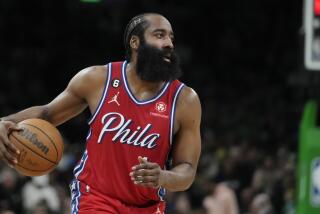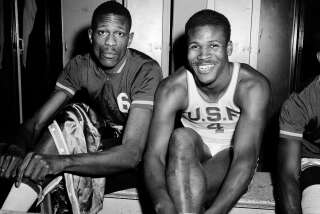ANALYSIS : Celtics Cut Their Losses by Trading Shaw for Douglas
- Share via
Bertrand Russell said “the unexamined life is not worth living.” Easy for him to say. Russell was a philosopher. Philosophers make their living examining life. What are they supposed to examine, thumbscrews?
But sometimes, too much introspection can be a dangerous thing. Brian Shaw, traded by the Celtics to the Miami Heat in exchange for Sherman Douglas Friday, is a prime example.
Somewhere along the line, Shaw started worrying about how to play basketball rather than just going out and doing it. It was as if a fine dancer suddenly became self-conscious and started looking at his feet. No wonder Shaw tripped himself up. Self-doubt is fine for philosophers, but fatal for athletes.
Shaw’s ongoing crisis of confidence gave the Celtics little choice: Trade him as his market value slipped, but before it plummeted. Douglas, who may have less talent, but has none of the self-doubt that debilitates Shaw, also had worn out his welcome with his old team, but for entirely different reasons. Both players need a change of scenery to realize their potential. This really is a trade that could help both clubs.
At first, it should help the Celtics more. Even when Shaw was at his best, he was not a point guard. Douglas is. Penetrating to the basket and dishing off never was Shaw’s strong suit. Penetrating to the basket and making the basket never was, either. And when he started getting whipsawed on defense by smaller, quicker guards, what else was there?
And so, the bizarre Boston chapter of the Brian Shaw story ends after 3 1/2 years. But unlike so many stories of No.1 draft choices that didn’t work out, few will ponder what might have been. Brian Shaw was not some innocent pawn caught in a numbers game.
He was a gentle and personable young man from California, the Celtics’ No.1 draft choice in 1988 out of UC-Santa Barbara. He was a late cut on John Thompson’s ill-fated Olympic team, and in his rookie NBA season, he exceeded expectations. Even as the Celtics were being wiped out by the Detroit Pistons in the playoffs, the young Shaw may have been their most impressive player.
Then, to the Celtics’ anger and disbelief, he bolted to play the 1989-90 season in Italy. Then he signed a new Celtics contract for 1990 and beyond, only to say, five weeks later, that the Celtics had pressured him into signing and that he would return to play in Italy for 1990-91. It took a court order and a $5,000-a-day contempt fine to change his mind.
Shaw and his insufferable agent, Jerome Stanley, had made a public relations mess for themselves, but when it was time to face the music back in Boston, Shaw handled it beautifully. Back in uniform, he was booed lustily when the Celtics opened their 1990-91 season at the Garden, but he smiled through it all; the boos, the banners, the questions from the media.
Once he started playing well, helping the team win, Shaw said, the boos would turn to cheers. He was right. It stayed that way for most of the season, but Shaw, out of sync after an injury, played poorly at the end of the regular season and was almost invisible in the playoffs. Except, of course, when Indiana Pacers point guard Micheal Williams was blowing past him every 30 seconds or so.
Rookie Dee Brown was playing and Shaw was sitting at crunch time. In the off-season, the Celtics could have traded Shaw for the Bullets’ No.1 pick in the draft (eighth overall).
They didn’t. They gambled that Shaw would regain the form he showed as a rookie and early last season. He hasn’t. He missed training camp and the first month of the season with a series of injuries.
He regained his health, but not his game or confidence. Rarely did a week go by without a Boston sports section updating the Shaw confidence crisis. The more things changed, the more they remained the same.
“We thought he could build this year on what he did last (season), but it wasn’t happening, and it was obvious that it wasn’t happening,” Celtics senior executive vice president Dave Gavitt said. “We felt we had to do something.”
Gavitt was talking about Shaw, but he just as easily could have been talking about the bad karma that seems to be enveloping the team. Larry Bird and Kevin McHale are out with injuries, injuries with possible long-term ramifications that could be disastrous. Robert Parish had to leave the game after spraining an ankle in the third quarter of Friday night’s loss to Jimmy Rodgers and the Minnesota Timberwolves, whose pathetic 6-26 record includes two victories over the Celtics in six days.
The Celtics are in dire straits, and Brian Shaw’s non-performance is one of the reasons. Shaw is a smart and sensitive sort, perhaps too sensitive for his trade, because his Celtics story has become a ball of confusion that he seems no closer to unraveling.
He has shown little of the hardscrabble heart Douglas has. And now, rather unceremoniously, the Celtics have shown him the door. The arrivederci aroma Shaw leaves behind is not sweet. But then, neither are the circumstances. To most Celtics fans, he was a case of young love gone bad.
More to Read
Go beyond the scoreboard
Get the latest on L.A.'s teams in the daily Sports Report newsletter.
You may occasionally receive promotional content from the Los Angeles Times.










